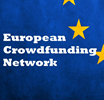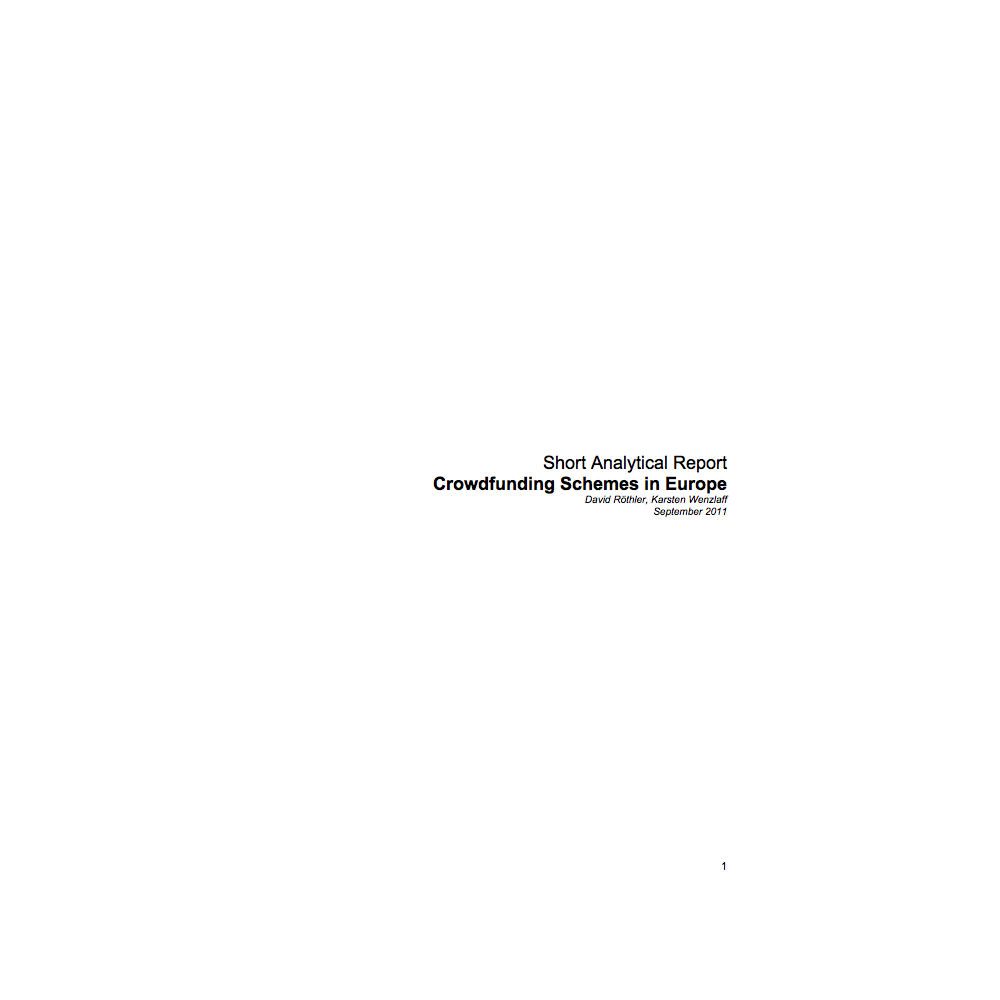For the 1st of June 2012, the pre-launch event of the European Crowdfunding Network is scheduled in Brussels. Here are some reasons why the network is needed urgently – and what can be done to make it successful.
Crowdfunding is much more than just crowdinvestment
Last week, I had a great discussion with Frank Peters, Koorstian Zandvliet from the Dutch Crowdfunding Platform Symbid and Peter Braun from Mountain Partners at the Annual Meeting of EBAN in Moscow. Of course, most of the discussion centered on crowdinvesting, which is crowdfunding with equity-returns or profit-based premiums.
However, as I pointed out, crowdfunding is much more than that: crowdlending is an important tool for business already, with platforms such as Buzzbnk, Kiva or Smava being used for small loans to entrepreneurs and small business. Upcoming platforms such as Finmar, which makes crowd-business-lending possible, show that this alternative method of credit financing is on the uprise.
Traditional crowdfunding, based on the model made popular by Kickstarter and Indiego, also has shown some great success for startups. Already several hundred prototypes have been financed through Kickstarter and Indiegogo in the US, and the European platforms have provided similar cases. Prototype crowdfunding offers great market insights and PR opportunities for startups, without having to distribute equity.
And of course, crowdinvesting is on the rise as a whole. Germany has seen almost a dozen Crowdinvesting platforms being established in the last few weeks, and more are coming. The same is happening in other countries in Europe as well.
The combination of all three forms of crowdfunding (crowdinvesting, crowdlending, and prototype crowdfunding) makes this new approach so interesting for start-ups and so threatening to traditional intermediaries between capital and ideas, such as Business Angels, Venture Capital Fonds and Banks.
Europe used to have a competitive advantage over the US – but will lose it soon
With the JOBS Act signed by US President Barack Obama, only a few months remain until crowdinvesting will show its full potential in the American Market.
With this development, Europe has much too gain, but also much to lose. Before the JOBS Act was signed, Europe had a competitive advantage over the US.
Most importantly, Europe allowed crowdinvesting. Whereas crowdinvesting was virtually impossible in the US, the European legal framework laid out in directives such as the Prospectus directive gave exceptions which made crowdinvesting under certain conditions viable and feasible. This has created a diverse and innovative crowdinvesting landscape in Europe – our study for the European Commission counted already two dozen crowdfunding platforms with some sort of profit-based mechanism.
Once the JOBS Act is implemented, this competitive edge is lost. Now the whole game depends on the legislative framework, which is subject to a dilemma. On one side, the legislative framework needs to make it easy for start-ups to use crowdfunding. On the other side, regulation needs to ensure that trust in crowdfunding prevails – and this applies to all three types of crowdfunding.
Therefore, we have to look closely at the exceptions for crowdfunding inside the regulation around public investment offers. Here Europe lacks behind what the US is proposing. The Senate proposal allowed crowdinvesting up to a limit of 1 million US-Dollars, the Prospectus directive sets the limit at 100.000 Euros.
A European Crowdfunding Networks is necessary to ensure that crowdfunding and crowdinvesting continue to be a special case of public offering of investments.
Providing information and gathering data on crowdfunding in Europe
None of the European crowdinvesting platforms have been able to reach a European audience. Due to language barriers, but also due to legal barriers, most platforms stay focused within the border of their nation state. This is in contrast to the idea of a European area of movement of capital, labor and most importantly ideas.
The first step to breach that information barrier is creating a dataset of crowdfunding activities in Europe. Our institute has done this for Germany, but for Europe similar data gatherings are not existent.
A European Crowdfunding Network should aim to collect and disseminate neutral data on Crowdfunding, Crowdinvesting and Crowdlending in Europe.
A strong voice towards the European Commission and the Parliament
Crowdfunding and crowdinvesting is already discussed at the highest level of the European institutions. Three General-Directorates (Research, Enterprise and Culture) are analysing crowdfunding. So far, the initiatives coming out of these discussions are sporadic, small and uncoordinated. Their impact is yet to be seen. But things might change soon.
A European Crowdfunding Network needs to have a strong and permanent presence in Brussels
Aliasing with other stakeholders
When I was in Moscow, it was clear that both Business Angels and Venture Capital Funds were trying to incorporate the idea of crowdfunding and crowdinvesting into their activities, trying to attract these platforms as members into their midst in order to have access to the dynamics of this topic.
Their offers shouldn’t be rebuffed right away. The networks of these associations is impressive and their standing with lawmakers and administrators in Brussels is a good one.
A European Crowdfunding should cooperate and closely work with other stakeholders in Brussels relating to financial regulation.
Extending the network beyond the platforms
With all of the above in mind, it is no surprising that a European Crowdfunding Network was on the verge of being founded. Right now, its 8 ambassadors are representing only a fraction of the crowdfunding scene in Europe, which comprises several thousand individuals by now.
I am looking forward to the pre-launch event in June. At the event, the Network will present the results of a survey on the expectations about crowdfunding – however, most importantly we will dscuss how to put this network on a strong footing.
A European crowdfunding network needs to go beyond the platforms and include users, researchers and experts.



7 Replies
-
Pingback: European Crowdfunding Network – perspectives of a European lobbying idea | Fund Fever
-
Pingback: Institut für Kommunikation in sozialen Medien » Jobs, growth, innovation or creative disruption – how to sell Crowdfunding to the European Union?
-
Pingback: Institut für Kommunikation in sozialen Medien » European Crowdfunding – Input for DG-Market
-
Pingback: Institut für Kommunikation in sozialen Medien » European Crowdfunding – Workings Groups and Input for Public Hearing of European Commission
-
Pingback: European CrowdFunding Network | IT.F Consulting im Netz
-
Pingback: Berlin Web Week / The Future of Crowdfunding – 16.4.2013
-
Pingback: Institut für Kommunikation in sozialen Medien » #Crowdfunding im Koalitionsvertrag – Was die #GroKo beschließen hätte können…
Comments are closed.